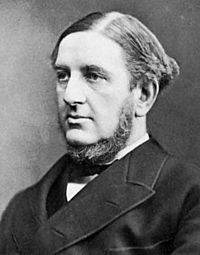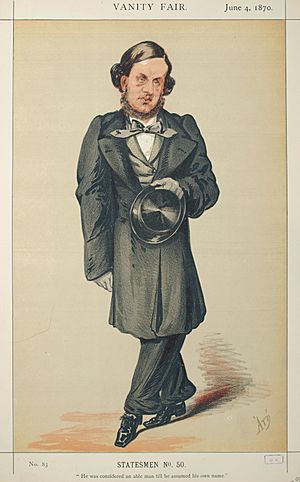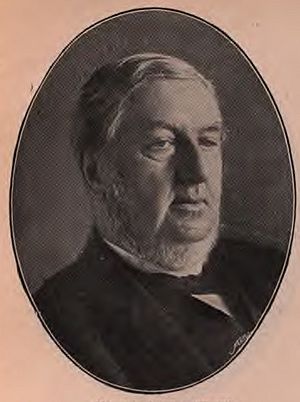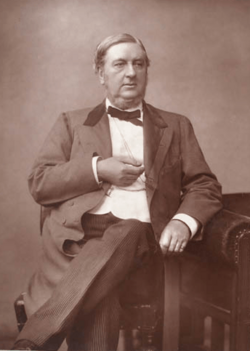William Harcourt (politician) facts for kids
Quick facts for kids
Sir William Harcourt
|
|
|---|---|
 |
|
| Leader of the Opposition | |
| In office 6 October 1896 – 8 December 1898 |
|
| Preceded by | The Earl of Rosebery |
| Succeeded by | Sir Henry Campbell-Bannerman |
| Chancellor of the Exchequer | |
| In office 18 August 1892 – 21 June 1895 |
|
| Prime Minister | William Ewart Gladstone The Earl of Rosebery |
| Preceded by | George Goschen |
| Succeeded by | Sir Michael Hicks Beach, Bt |
| In office 6 February 1886 – 20 July 1886 |
|
| Prime Minister | William Ewart Gladstone |
| Preceded by | Sir Michael Hicks Beach, Bt |
| Succeeded by | Lord Randolph Churchill |
| Home Secretary | |
| In office 28 April 1880 – 23 June 1885 |
|
| Prime Minister | William Ewart Gladstone |
| Preceded by | R. A. Cross |
| Succeeded by | R. A. Cross |
| Personal details | |
| Born | 14 October 1827 |
| Died | 1 October 1904 (aged 76) |
| Nationality | British |
| Political party | Liberal |
| Spouses | (1) Maria Theresa Lister (d. 1863) (2) Elizabeth Cabot Motley (d. 1928) |
| Alma mater | Trinity College, Cambridge |
Sir William George Granville Venables Vernon Harcourt (born October 14, 1827 – died October 1, 1904) was an important British politician. He was a lawyer and journalist before becoming a leading member of the Liberal Party. He served in the British Parliament for different areas like Oxford and Derby.
Sir William held major government jobs, including Home Secretary and Chancellor of the Exchequer. He worked under Prime Minister William Ewart Gladstone. Later, he became the Leader of the Opposition. He was known for being a very good speaker in Parliament.
Contents
Family Background and Early Life
William Harcourt was born into an important family. His father, William Vernon Harcourt, was a scientist. The family owned a large estate called Nuneham Park in Oxfordshire. His grandfather was the Archbishop of York.
William's family had connections to many famous English families. He was proud of these links. He was the second son in his family.
School Days and Early Career
William had a strict childhood. He was taught at home by a teacher from Switzerland. When he was eight, he went to a private school. His father did not send him to a big public school.
In 1840, William saw the "Preston bread riots." These were protests by people who were struggling. In 1846, he went to Trinity College, Cambridge. He studied mathematics and classics there. He graduated with high honors in classics in 1851.
At Cambridge, William changed his political views. His family were Tories, but he started supporting Sir Robert Peel. His father wanted him to become a professor or politician. But William chose to study law and become a journalist. He became a lawyer in 1854.
He quickly became known as a good speaker. He wrote for newspapers like the Saturday Review and The Times. He often wrote about international law. During the American Civil War, he wrote articles supporting Britain staying neutral. He became a top lawyer, a Queen's Counsel, in 1866. In 1869, he became a professor of international law at Cambridge.
Joining Parliament
William Harcourt became a Member of Parliament (MP) for Oxford in 1868. He was a member of the Liberal Party. In 1873, he became the Solicitor General and was made a knight. This meant he could be called "Sir."
In 1880, the Liberals won the election. Even though he hadn't always supported Gladstone strongly, William was made Home Secretary. This job meant he was in charge of law and order in the country. He lost his seat in Oxford but quickly found a new one in Derby. He represented Derby until 1895. After losing there, he became an MP for West Monmouthshire.
As Home Secretary, he helped pass important laws. These included the Ground Game Act 1880 and the Explosive Substances Act 1883. This last law was passed very quickly to help keep people safe. He was very firm on law and order. He also tried to change how London's local government worked.
Chancellor of the Exchequer Role
William Harcourt was seen as one of the most skilled leaders of the Liberal Party. When Gladstone became Prime Minister again in 1886, Harcourt was made Chancellor of the Exchequer. He held this important job again from 1892 to 1895. As Chancellor, he was in charge of the country's money and taxes.
Between 1880 and 1892, he often acted as Gladstone's main helper in politics. He was a strong debater and very valuable to his party. However, some people felt he spoke like a lawyer arguing a case, rather than someone deeply believing in a cause.
In 1894, he introduced a very important budget. This budget changed how "death duties" were paid. Death duties are taxes on property left behind when someone dies. He made the tax the same for all types of property. This was a big change. It was joked that this was a "second son's revenge" because he was a second son and might not have expected to pay these taxes himself. But later, he did inherit his family's estate and had to pay them!
After Gladstone retired in 1894, Lord Rosebery became Prime Minister. Harcourt became the leader of the Liberal Party in the House of Commons. However, he and Rosebery often disagreed. Their different ideas made it hard for them to work together smoothly.
Leading the Opposition
In the 1895 elections, the Liberal Party faced problems. Harcourt lost his seat in Derby. This was a sign of the party's overall defeat. He was elected again for West Monmouthshire. But he seemed less motivated for the hard work of being in opposition.
In 1896, Gladstone gave his last public speech. He asked for help for the Armenian people who were being harmed in the Ottoman Empire. Harcourt supported Gladstone. Lord Rosebery then resigned as Leader of the Opposition. Harcourt took over, but he was not very enthusiastic about it.
During his time as leader, there was an investigation into the Jameson Raid. This was a failed attack in South Africa. Harcourt's actions during this investigation disappointed some Liberals. In December 1898, Harcourt resigned as Leader of the Opposition. He said it was because of disagreements within the party. This caused a big split in the Liberal Party.
Even after stepping down, Harcourt continued to speak out. He criticized the government's money policies and their actions in South Africa. He was a great debater and often used humor in his speeches. He also spoke out against certain practices in the Church of England. In 1904, he inherited his family's estate at Nuneham. He found the estate had financial problems, partly because of the death duties he had introduced. He died suddenly that same year.
Harcourt was offered a special title (a peerage) in 1902. But he turned it down. He wanted to stay in the House of Commons and help his son's political career.
Family Life and Children
On November 5, 1859, William Harcourt married his first wife, Maria Theresa Lister. They had two sons:
- Julian Harcourt (1860–1862)
- Lewis Harcourt, 1st Viscount Harcourt (1863–1922). He later became a very important politician himself.
His first wife died in 1863, shortly after their second son was born. William Harcourt remained a widower for 13 years.
On December 2, 1876, he married his second wife, Elizabeth Cabot Motley. She was the daughter of an American historian. She had been married before. With Elizabeth, William Harcourt had his third son:
- Robert Harcourt (born 1878). He also became involved in politics.
In Popular Culture
Sir William Harcourt was featured in some funny parody novels. These books were based on Alice in Wonderland. Examples include Clara in Blunderland (1902) and Lost in Blunderland (1903).
See also
- Harcourt interpolation
 | Mary Eliza Mahoney |
 | Susie King Taylor |
 | Ida Gray |
 | Eliza Ann Grier |




